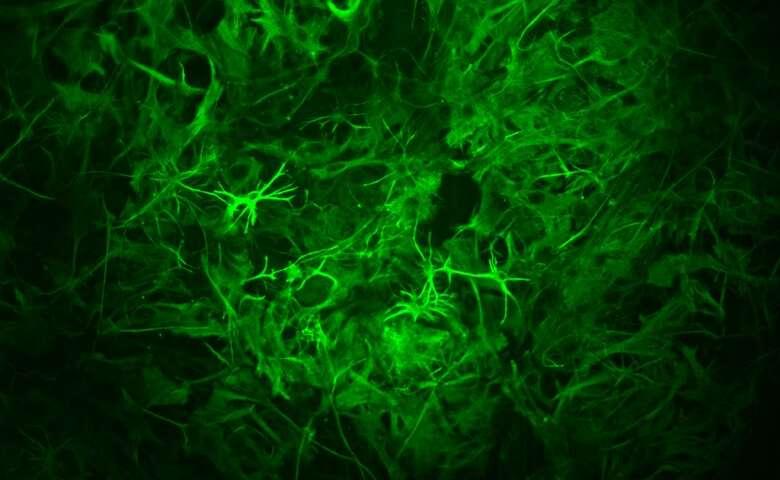Long -term Memory Involves Cells Other Than Neurons

Astrocytes with green fluorescent antibody tagging. Image Courtesy: medicalexpress.com
Long has been passed since Ramon y Cajal’s Neuron doctrine has been accepted as a scientifically validated way of looking at how the brain functions. The Neuron doctrine laid the foundation of visualisation of the brain and the myriads of functions it does as the outcome of activities of individual cells, known as the neurons. But recent neurobiological findings suggest that brain functioning involve cells types other than only neurons, which only makes the brain more complicated to understand.
One such non-neuron type of cell are the astrocytes. These star-shaped cells have long been intriguing to the scientists. It is an established fact that astrocytes act as supporting cells of the neurons in their functioning in various processes. But, astrocytes’ functions can be more elaborate that only as a support system, if we go with the recent evidences. The recent study published in the journal Glia by Sejnowski et al. has reported that astrocytes play a very important role in the formation of long-term memory. The findings are also expected to inform therapies directed towards disorders where long-term memory gets impaired, for example dementia or traumatic brain injuries.
For any kind of brain activity, the basic task performed by the neurons is the passage of signal from one cell to the other. Essentially, these signals are of electrical and chemical nature. Without a signal, either an electrical or a chemical one, no communication takes place among the neurons and there is no brain activity. This also is the premise of the Neuron doctrine.
In the case of a chemical signal, one neuron throws a chemical known as the neurotransmitter and the other neuron in the vicinity catches that chemical and thus a signal is being passed. Likewise, the astrocytes secrete a kind of chemical called the gliotransmitter. Traditionally, it has been thought that the astrocytes’ function is to provide support to the more active neurons by providing nutrients, cleaning up debris etc. Only recently there have been indications that astrocytes’ function might not only confine to providing support to neurons, they, with the secretion of gliotransmitters, could perform much important tasks. But it has remained largely unknown.
The Sejnowski paper comes as a first in providing solid scientific evidence of astrocytes being involved in a task as important as long-term memory. The team genetically engineered mice that lacks a protein called IP3R2 (inositol 1, 4, 5 triphosphate), which astrocytes use to release calcium for cellular communication.
The researchers then exposed the genetically modified mice to some behavioral experiments along with normal ones. They used a maze where the mice had to find the exit point. After many rounds of practice the mice learn how to find out the exit from the maze. They then analysed how far the genetically engineered mice lacking the protein could remember the task in comparison to the normal ones. What they found is within a period of 24 hours to 48 after the training of finding the maze exit, both the IP3R2 lacked mice and the normal mice could remember the task almost equally efficiently. Also, learning the task was found to be invariant in both types of the mouse. But when judged after two to four weeks of receiving the training, the efficiency of remembering varied widely in the engineered and the normal mice. The engineered mice were found to be less efficient in remembering how to find the maze exit in comparison to the normal ones.
After a few-weeks delay, normal mice actually performed better than they did right after training because their brain had gone through a process of memory consolidation," explains António Pinto-Duarte, the lead author of the paper. "The mice lacking the IP3R2 receptor performed much worse."
The process of memory consolidation involves several mechanisms that affect the neurons. One of these is the strengthening of the connections between neurons involved in a memory process. Sejnowski’s team found that in both the normal and the IP3R2 lacked mice, these strengthening were similar. This finding suggests that the astrocytes may be playing a significant role in the process of long-term memory.
Get the latest reports & analysis with people's perspective on Protests, movements & deep analytical videos, discussions of the current affairs in your Telegram app. Subscribe to NewsClick's Telegram channel & get Real-Time updates on stories, as they get published on our website.














